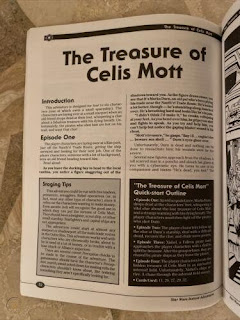I’m
trying to jumpstart my work on a neglected system-neutral fantasy
roleplaying setting and, in seeking inspiration to fuel some creative
momentum, I’m looking
at
some of my favorite roleplaying game supplements for ideas and
reviewing notes I’ve gleaned from others on relevant game design.
My reading includes the Instant
Adventures
collection for West End Games’ D6
System Star Wars Roleplaying Game.
Although filled with scenarios, its original design parameters offer
some ideas on how I might approach developing and presenting my
setting sourcebook – short, easily digestible sections with maps
and sidebars to quickly orient readers – still useful 20 years
later
in our Internet Age of instant gratification and dwindling attention
spans.
The
project began in 1996 for publication the following year. Up to that
time West End’s
Star
Wars Roleplaying Game
adventures primarily
released
as
standalone books featuring involved scenarios a group might play
through over several sessions;
the notable
exception being the
Star
Wars Adventure Journal,
which offered a mix of short
scenarios,
source material, and game-related fiction. Such large adventures
required the gamemaster to read the entire book and become familiar
with all the encounters, locations, resources,
and forces
at work related to the characters. West End’s creative staff
collaborated on a
collection of short scenarios in
a format gamemasters could pick up, read quickly, and easily
reference during one session’s play, providing a satisfying
standalone adventure that might even develop into a campaign. The
parameters sent to contributors – freelancing staffers and notable
out-of-house designers – focused on presenting short adventures
with elements to make the gamemaster’s job of running it with
little notice as easy as possible. The word count was probably around
5-6,000 words each, including three to five episodes (the narrative
framework the game had always used in presenting scenario
information). Several sections and sidebars broke out essential
information: a “Quick-
start
Outline” provided a quick briefing on the overall action so
gamemasters knew what to expect; “Staging Tips” helped them
integrate the scenario into an existing campaign with the players mix
of characters; “Spawning a Campaign” offered ideas on using the
adventure as a springboard for further game sessions. The
assignment required authors to include at
least one map (preferably more), ideas for “player handouts” like
invitations and datapad readouts, and short stats for several
adventure elements
along
with the usual illustration suggestions. The
book came in at 64 pages – the smallest page count the company
would produce at the time – but included some quality components in
the four pages of perforated cards bound in the back, each with the
stats for characters, vehicles, creatures, and equipment found in the
scenarios (as well as a full-color illustration). I advocated for the
stat cards, which I’d used in my home campaigns for easy reference
(and one
finds in a few other products of that time, including the
Star
Wars Introductory Adventure Game).
I don’t
recall the circumstances behind the project’s inception. Given the
contributors primarily included West End staffers or trusted
freelancers it might have started as one of those projects we pulled
out of thin air when another book on the schedule encountered
unmanageable
delays (and there were a few, though 20 years later I can’t recall
many
specific ones). While
I never had much insight into sales numbers,
Instant
Adventures
seemed an instant hit with gamers who wanted to bring one-session
scenarios to the table with minimal preparation. I keep a copy near
my rulebook in case I ever need a scenario to run at a moment’s
notice. I still rank it
fifth
on my personal list of
most influential Star
Wars Roleplaying Game
products West End released. Years
later
West
End staffer and contributor
Eric Trautmann brought many
Instant
Adventures
authors back together for
Every Star A Destination
for Adamant Entertainment, which used
a similar
approach
presenting
a handful of quick-start science fiction adventures for use with
D6
Space
(to which I also contributed).
So how
does Instant
Adventures
inform
my current work on a setting sourcebook all these years later? It
reminds me to keep things brief: stick to core concepts, cut down
excess verbiage (a persistent character flaw with me), and don’t
linger too long on any particular section. Use sidebars, maps,
and player handouts to
call attention to key information and break up the page layout. Early
on I decided to
provide gamemaster
character summaries of their outward demeanor, covert motivations,
and other aspects useful for interactions with characters, both
as an outline device as I elaborate on them and for quick reference
for gamemasters. I hope
to supply
plenty of adventure hooks to help readers envision how they might
transform the setting they read into an experience they and their
players can immerse themselves in a the game table.
Instant
Adventures
isn’t the only roleplaying game resource I’m reviewing for
inspiration. I’m getting lost paging through products that inspired
me as a player years ago to glean ideas on approaching my own fantasy
setting. We don’t always remember to remove the blinders focusing
(and
sometimes limiting)
our vision in game design and other aspects of life, but examining
how others approach similar
challenges
can help us determine the best course for our own projects.



"I don’t recall the circumstances behind the project’s inception." If memory serves, this book was George Strayton's brainchild. He had a very clear vision of the whole "pick up and play FAST" element and the color cards.
ReplyDeleteGeorge got "Project Concept" credit on this, so that makes sense. Don't know why I thought it was a quick fill-in for a schedule blow-up...probably had more of those than I can recall.
ReplyDelete